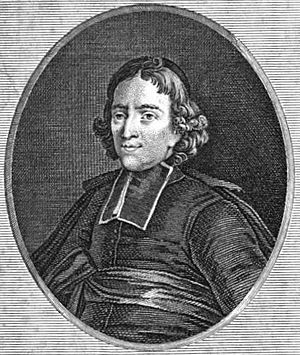Jean Meslier facts for kids
Quick facts for kids |
|
|---|---|
 |
|
| Church | Roman Catholic Church |
| Personal details | |
| Born | 15 June 1664 Mazerny, France |
| Died | 17 June 1729 (aged 65) Étrépigny, France |
| Nationality | French |
| Denomination | Roman Catholic |
Jean Meslier (born June 15, 1664 – died June 17, 1729) was a French Catholic priest. After he died, people found a long book he had secretly written. In this book, he shared his ideas that went against religion. He called it his "testament" for the people in his church.
Contents
Life of Jean Meslier
Jean Meslier was born in a town called Mazerny in France. In 1678, he started learning Latin from a local priest. He later joined a seminary, which is a school for training priests. He said he did this to make his parents happy.
After finishing his studies, he became a priest on January 7, 1689. He served in a village called Étrépigny. Meslier lived a very simple life, almost like a poor person. He gave any extra money he had to people in need.
When Meslier died in Étrépigny, three copies of a long handwritten book were found in his house. In this book, he wrote that organized religion was like "a castle in the air". He also said that theology, the study of religious faith, was "ignorance of natural causes reduced to a system."
Meslier's Ideas and Beliefs
In his book, Testament, Meslier questioned the idea of God, even the general idea of a God that some people believed in. He wondered why bad things happen if there is a good and wise God. He didn't think that suffering made people better or had any spiritual value.
Meslier believed that religions were made up by powerful leaders. He felt that early Christians were good at sharing their things. However, he thought that over time, Christianity started to encourage people to accept suffering and obey unfair rulers, like the kings of France. He felt that unfairness was often explained away as being the will of a wise being.
Meslier's main idea was that of an atheist. This means he did not believe in God. He also did not believe in the idea of a soul or that people had complete free will. In his book, he wrote that if God is too hard for humans to understand, then it might be best not to think about God at all. He even called God a "chimera," meaning an impossible idea. He argued that believing in God was not needed for people to be good. He concluded that people's duties to be good would always be the same, no matter what they believed about God.
Meslier also strongly spoke out against unfairness in society. He imagined a type of rural communism. In this idea, everyone in a region would belong to a commune. In these communes, wealth would be shared, and everyone would work. These communes would be based on love and brotherhood. They would work together to help each other and keep the peace.
Meslier also thought that Christians did not show enough care for animals that suffered because of humans. According to Matthieu Ricard, Meslier saw this as more proof that their God either did not exist or was not kind.
Voltaire's Version of Meslier's Work
Many shorter versions of Meslier's Testament were printed and shared. These versions were called "extraits" (extracts). They made the original long and complicated book shorter. Sometimes, these extracts even added new material that Meslier did not write.
The famous writer Voltaire often wrote about Meslier in his letters. He told his daughter to "read and read again" Meslier's book. He also said that "every honest man should have Meslier's Testament in his pocket." However, Voltaire also said Meslier wrote "in the style of a carriage-horse," meaning his writing was not very elegant.
Voltaire published his own edited version of Meslier's work in 1762. He changed Meslier's ideas so that Meslier seemed to be a deist, like Voltaire himself. A deist believes in a God who created the world but does not interfere with it. Voltaire's version made Meslier seem less like an atheist. It also completely left out Meslier's ideas against kings and his proto-communist views.
Another book, Good Sense, was published without an author's name in 1772. For a long time, people thought Meslier wrote it. But it was actually written by Baron d'Holbach.
The complete Testament of Meslier was first translated into English in 2009.
Meslier's Impact and Legacy
The atheist philosopher Michel Onfray wrote in his 2007 book In Defense of Atheism that Meslier was the first person to write a whole book supporting atheism. Onfray said that Meslier dedicated his book to showing that all religions were "vain and false." He noted that Meslier spent most of his life working on this book, which was published after his death in 1729.
Raoul Vaneigem, a cultural thinker, praised Meslier for standing up against powerful leaders. He said that Meslier was one of the last priests who truly supported the revolutionary ideas of his religion.
According to Colin Brewer, who helped create a play about Meslier, historians argue about who was the first open atheist after ancient times. But Meslier was likely the first to put his name to a document that was clearly atheist. Brewer believes that Meslier is not widely known because Voltaire changed his work. Voltaire's version made Meslier seem like a deist and hid his ideas against kings and his early communist views.
See also
 In Spanish: Jean Meslier para niños
In Spanish: Jean Meslier para niños
 | Misty Copeland |
 | Raven Wilkinson |
 | Debra Austin |
 | Aesha Ash |


